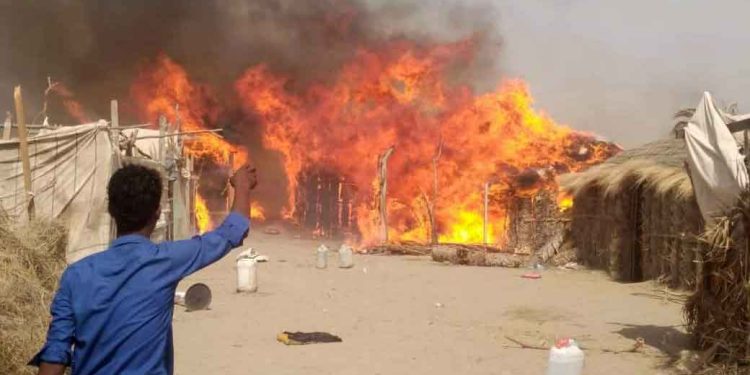Seven displaced Yemenis died when a huge fire broke out at Al-Bawani camp for internally displaced people in Ma’rib governorate.
The fire, caused by an electrical short circuit in two tents housing two displaced families, has resulted in the tragic death of seven refugees, including women and children.
Another person was severely injured during the incident and moved to hospital in critical condition.
The fire is considered the most fatal incident in Marib camps.
This is not the first deadly fire in Yemeni camps for internally displaced people due to the poor safety means and weak services.
The United Nations Children’s Fund (UNICEF) had recently warned that millions of Yemenis would plunge into famine, if urgent action was not taken in the crisis-stricken Arab country.
The United Nations shared a tweet saying, “Children in Yemen are not starving due to the lack of food, but because their families cannot afford food.”
The UN Refugee Agency in Yemen also revealed that over 1,200 Yemeni families, mainly from Hudaydah, Marib and Shabwah, have fled their homes in the first two weeks of 2022.
This adds up to the 4.2 million people already displaced across the country since the outbreak of the war in Yemen in 2015.
The UNHCR further pointed out that the humanitarian needs are massive, while funding is very limited.
The reports came as Yemen continues to be mired in a years-long conflict underway, which in addition to the loss of life is tearing apart livelihoods, social fabric, causing Yemen to teeter on the brink of famine, and resulting in widespread reversals of development progress.
For seven years, Yemen has been witnessing a war that has claimed 233,000 lives, and caused the worst humanitarian crisis in the world, leaving 80% of the population (30 million) dependent on aid to survive.
The UN has called Yemen the world’s worst humanitarian crisis, with 80 percent of the population reliant on aid.






























